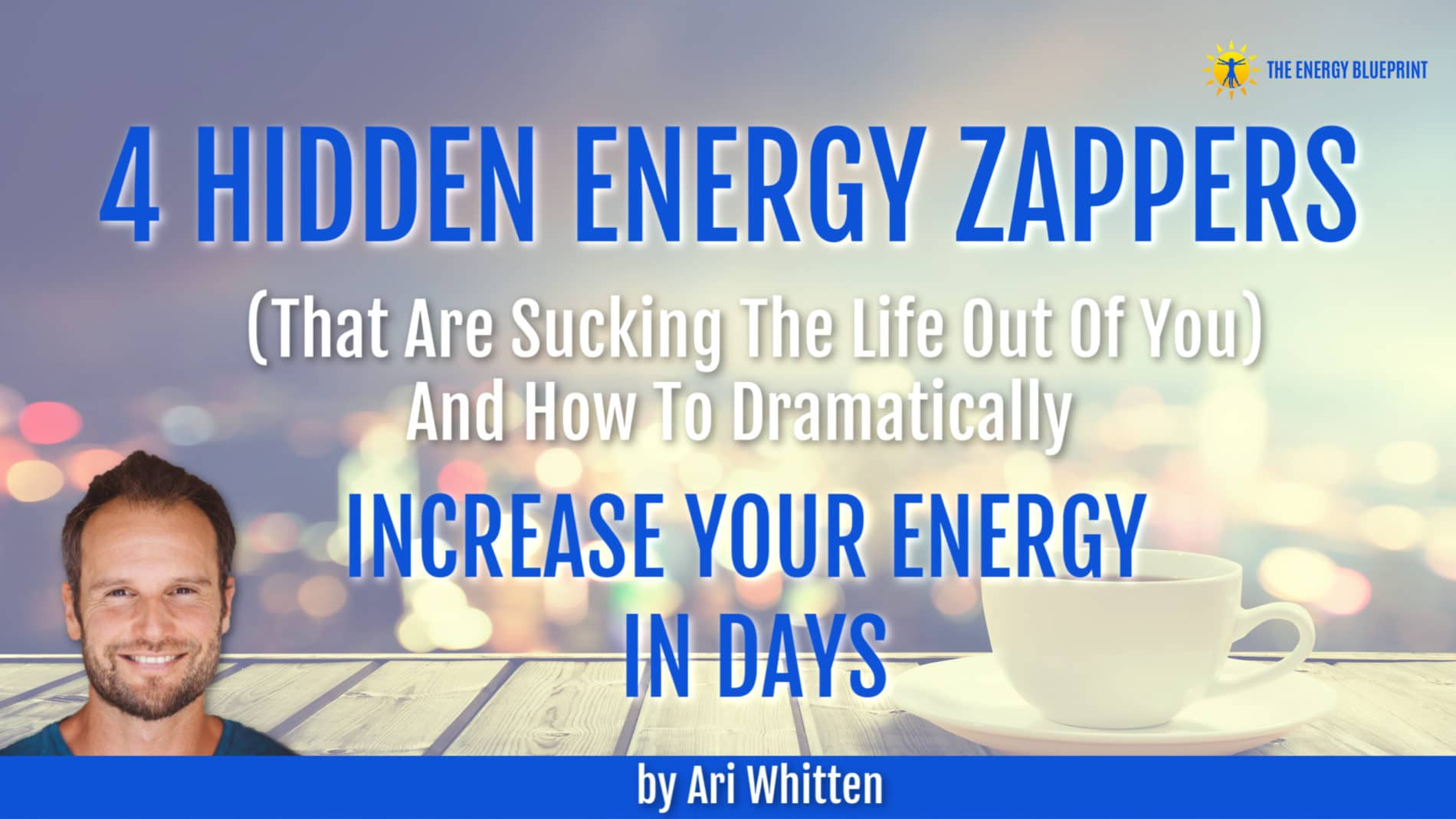#1 – YOUR DAILY COFFEE IS LYING TO YOU — OVER TIME, IT’S NOT ENERGIZING YOU, BUT ACTUALLY ZAPPING YOUR ENERGY
”Coffee – an energy zapper?! But coffee gives me energy!”
This might seem very counter-intuitive at first, since caffeine is known to provide a buzz of energy. But it turns out that there is a critical difference between short-term and long-term effects of caffeine use.
 When you drink coffee daily on an ongoing basis, it doesn’t give you energy — it’s actually wrecking your energy.
When you drink coffee daily on an ongoing basis, it doesn’t give you energy — it’s actually wrecking your energy.
Now, let me emphasize one more important point here before I explain the science here: Coffee is not all bad! There are actually several health benefits associated with coffee consumption. It can lower your risk of diabetes, cardiovascular disease, some neurological diseases, and even some cancers.
So again, coffee is definitely NOT all bad!
However, the way most people use it, while they may be lowering their risk of some diseases, they are also simultaneously dramatically lowering their mood, day-to-day function (including their brain performance) and most importantly, their energy levels!
And this is an insidious process because while it’s wrecking your energy, it’s actually making you believe that it’s giving you energy. [1]
Let me explain…
To understand caffeine, you first need to understand a neurotransmitter in the brain called adenosine.
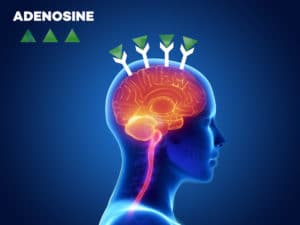 Adenosine is an “inhibitory neurotransmitter” in the brain — that means that it makes you tired, relaxed and sleepy. In fact, adenosine is one of the major signals telling your brain it’s time to go to sleep at night. So think of it like this: When the adenosine molecules plug into the receptors for adenosine in the brain, that triggers you to feel tired and low on energy.
Adenosine is an “inhibitory neurotransmitter” in the brain — that means that it makes you tired, relaxed and sleepy. In fact, adenosine is one of the major signals telling your brain it’s time to go to sleep at night. So think of it like this: When the adenosine molecules plug into the receptors for adenosine in the brain, that triggers you to feel tired and low on energy.
So what does adenosine have to do with caffeine?
Simple: Caffeine actually exerts its effects on the brain (you know, feeling awake and energetic) by working on the adenosine receptors. But it works in the opposite way as adenosine does. When adenosine fits into the adenosine receptors, it makes you fatigued and sleepy. But when caffeine hits the adenosine receptors, it doesn’t active them – it just blocks the adenosine from getting in!
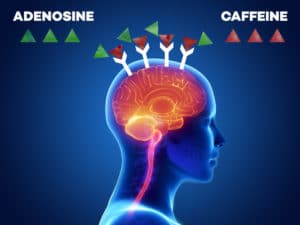 In other words, caffeine blocks the neurotransmitter (adenosine) that would normally be making you feel sleepy and low on energy. By blocking the fatiguing effects of adenosine, it creates a stimulant effect that energizes you.
In other words, caffeine blocks the neurotransmitter (adenosine) that would normally be making you feel sleepy and low on energy. By blocking the fatiguing effects of adenosine, it creates a stimulant effect that energizes you.
That sounds good so far, right? It sounds like caffeine is a great way to energize your brain and body. And it is!
But, here’s the big problem: this only works in the short-term!
When you consume caffeine every day, your brain doesn’t like the fact that you’re constantly blocking adenosine, so it begins to fight back!
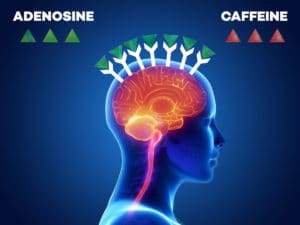
When you consume it daily, your brain senses that it’s being chronically overstimulated, so it actually increases the amount of adenosine and adenosine receptors in the brain. That is bad news. More adenosine and adenosine receptors in the brain means a couple problems emerge:
- It LOWERS your baseline levels of energy (and mood, as well as brain performance)
- Even worse, it makes you dependent on caffeine just to get back up to a normal level of function. That’s why people who drink coffee every day wake up with low energy levels, often not in a good mood, and often foggy headed. That’s why they “NEED” their coffee in the morning to get switched on.
That’s the big key that almost every coffee drinker is totally unaware of: Even though you think that your daily coffee is giving you a great boost of energy, what you don’t realize is that you’re actually just getting a boost back up to what used to be your normal level of energy and performance!
In other words, the coffee has actually lowered your normal baseline level of energy, mood, and performance — that’s why you wake up tired and groggy and rush to get your caffeine in — and you’ve made yourself dependent on caffeine just to function normally. In short, while most people think that their daily coffee habit is helping them function, it’s actually sabotaging their mood, performance and energy levels and created a drug-like dependence just to be able to get back and function normally.
So, how can you get the benefits of coffee without worsening your mood and energy levels in the long-term?
Luckily, the answer is simple, cycle on and off caffeine. Use it for one or two days, and then take one or two days off of it. Or use it for a week and then take a week off.
However, for those of you who drink more than one cup every day, in the beginning, it is not quite that simple. First, you need to clean out your system and reset your entire neurotransmitter system in your brain if you have been a chronic caffeine consumer.
Like I said before, when you drink it every day your brain makes negative adaptations in those neurotransmitter systems which leads to caffeine fatigue. To undo those negative adaptations, and increase your baseline level of energy and performance you have to do something that is going to feel really hard for a lot of people.
You have to give your brain a complete break from caffeine for several weeks. I recommend at least three weeks completely off caffeine, but five to six weeks is optimal.
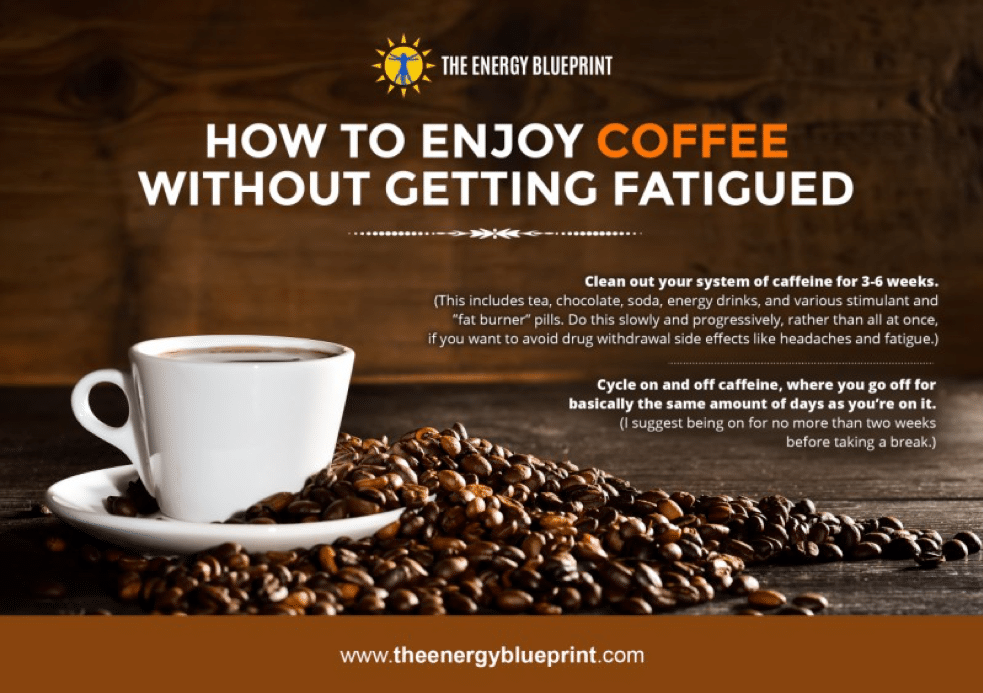
Basically, what you want to do is this:
- Step 1 – Clean out your system of caffeine for 3-6 weeks. (Do this slowly and progressively, rather than all at once, if you want to avoid drug withdrawal side effects like headaches and fatigue.)
- Step 2 – Cycle on and off caffeine, where you go off for basically the same amount of days as you’re on it. I suggest being on for no more than two weeks before taking a break. Ideally, use it in a targeted way specifically on days where you need an extra boost. That way, you’ll actually get a real boost (instead of just undoing the negative effects and going back up to what used to be your normal).
If caffeine lowers baseline energy and mood, why am I telling people to still use it?
Simple: First, many people love it and can’t live without it. Second, do you remember all those health benefits I told you are associated with drinking coffee? That’s why!
You can use it and get a real boost, and get the long-term health benefits, but without the long-term negative effects on your mood and energy (or becoming dependent on it just to function normally).
This is how to get all the benefits of coffee for your health, with none of the drawbacks on your energy!
#2 – NOISE DURING SLEEP IS KILLING YOUR DEEP SLEEP (I.E. SLEEP QUALITY)
Several studies have now shown that noises of almost all kinds can profoundly disturb your sleep quality. So even if you are technically asleep, they can impair your “sleep efficiency”, which is how regenerative your sleep is per hour.
In other words, you can get 7-8 hours of really deep restorative sleep or 7-8 hours of poor sleep that isn’t nearly as healing. Ultimately, over time, this can mean the difference between waking up fatigued and groggy or waking up with energy and ready to conquer the day.
Here’s just one of the studies showing how noise disturbs sleep, titled “Street noise and sleep.”[i]
Researchers found that traffic noise during the night had the following effects:
- People took longer to fall asleep
- They woke up more frequently during the night
- It reduced their total sleep time
- It reduced their sleep efficiency during the time they were asleep – it decreased the amount of time they spent in REM and deep sleep (the phases most necessary for cellular regeneration).
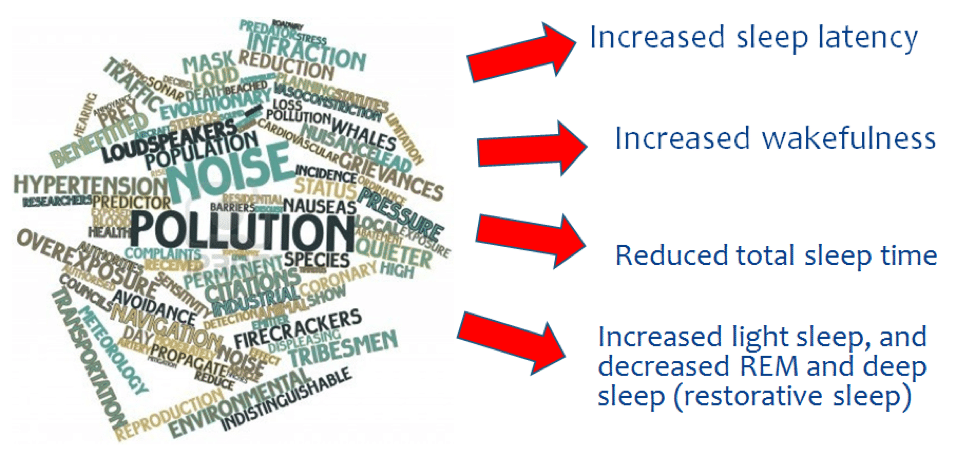
So how do you resolve this issue, without having to pack up and move to the countryside?
Turn on the pink noise!
In a 2012 study, researchers found that pink noise improved brain waves to produce more stable sleep.[ii]
Another 2017 study published in Frontiers in Neuroscience found that pink noise dramatically improved older adults’ memory, and most importantly, improved the amount of time spent in deep sleep, which is the most critical phase to cellular healing/regeneration – which ultimately means waking up with more energy.[iii]
Some tips:
- Sound machines designed to help you sleep produce a low-level soothing noise. These can help you tune out barking dogs, the TV downstairs, or any other disturbances so you can fall asleep and stay asleep.
- If you live in a city with cars and various noises from outdoors, this is critical.
If you want a free option, I recommend downloading a free app on your phone like “Lightning Bug” or NoiseZ that will play pink noise. Just put your phone outside your bedroom door (or if you have a big bedroom, at least 6 feet away from your bed) and play it while you sleep. You want to get it loud enough that it will cover up most other external sounds, but not so loud that the noise itself is disturbing you.
If you live in a place that’s noisy (especially the kind of noise that’s bursts of abrupt sounds rather than constant noise), this one little free strategy can make a huge difference in your sleep quality at night and your energy levels during the day.
#3 – THINK YOU’RE A NIGHT OWL AND GO TO SLEEP PAST MIDNIGHT? YOU’RE PROBABLY NOT ACTUALLY A NIGHT OWL, AND YOUR SLEEP SCHEDULE IS SUCKING THE LIFE OUT OF YOU
 Many people think they’re a night owl and that their natural pattern is to stay up late each night and wake up late in the morning.
Many people think they’re a night owl and that their natural pattern is to stay up late each night and wake up late in the morning.
While it is true that there are slight differences in chronotypes (the natural circadian rhythm pattern) and that some people generally do tend to be more night owl chronotypes, most people who think they’re night owls actually aren’t – and they’re paying a price for it each day in terms of their mood and energy levels.
Here are just some of the deleterious health effects associated with the night owl chronotype:
- Increased insulin resistance. [iv]
- Among those suffering from fibromyalgia, night owl chronotypes are most strongly debilitated by the syndrome.[v]
- Stronger drive to eat unhealthy junk food.[vi]
- Much more likely to be depressed.[vii]
Now I know you’re probably reacting to that and saying, “no, but I really am a night owl.”
Well, here’s the reality: Certain factors in the modern world actually have shifted most people’s circadian rhythm (the 24-hour biological clock in their brain) into more of a night person rhythm than their body is actually designed for.
One big factor here is artificial light exposure at night (which I’ve written about extensively here).
In short, light entering our eyes at night signals to the clock in our brain “it’s daytime, the time to be awake, alert, and energetic.” This then shifts your body clock into a later time zone than the one you’re actually in.
Also, the fact that we have a night-time social interactions and it’s common to stay out later for those kinds of social engagements.
The modern world basically wires us in to a later circadian rhythm than the one we should be in based on when the sun is rising and falling.
So in other words, based on when the sun is rising and falling, we should be, let’s say going to sleep at 10pm, but the circadian clock gets “phase-shifted” into a time zone that is two or three hours later than the one that it actually should be in.
So again, if you think you’re a night owl, your natural and optimal rhythm is almost certainly earlier than you think.
Now it is possible to be a true night owl, but the rhythm that you should be in is probably still earlier than you think it is. Specifically your optimal bedtime is probably one to 3 hours earlier than you think it is.

Here’s why I say that. There was a recent study where researchers took a bunch of people that were self-proclaimed night owls and that were commonly going to bed around midnight or 1:00 am or 2:00 am and waking up late in the morning, and all they did is basically just send them on a camping trip. [viii]
They just said, go outdoors, sleep in a tent, no artificial lights, no phones, no TVs, no streetlights, no indoor lighting, none of that stuff. Just get out in nature, sleep in a tent so the only lights you’re being exposed to are the rise and fall of the sun, the moon, firelight and so on.
Here’s what happened…
All of the campers – even the night owls – shifted their circadian clocks and started going to bed and waking up several hours earlier, within just a few days!
The researchers concluded: “The campers slept for roughly the same amount of time each night as before, but fell asleep two hours earlier and a woke without alarm clocks two hours earlier as well.”
Again, within just a few DAYS, they shifted towards a sleep schedule that more closely mirrored the setting and rising of the sun by a whopping two full HOURS.
In other words, people who swore they were “night owls” and usually go to sleep at 12pm or 1am or 2am (and waking up at 8am-11am) started going to bed at 9pm-11pm and waking at around 6am or 6:30am!
They said in some of the articles talking about this, the time spent outdoors during the day and night “restored a natural sleep cycle, turning even night owls into early risers.”[ix] [x]
This was the actual study published in the journal, current biology This is an important one because a lot of people think that they’re night owls and that their natural pattern, their chronotype is to be more of a night person and that their natural pattern is actually a lot later then it actually is.
What does this mean for you?
It means that the optimal rhythm for the human biological clock – our circadian rhythm, which directly controls numerous hormones and neurotransmitters that impact on our energy levels, sleep and mood – is optimized by an earlier bedtime than most people think.
 In Chinese Medicine, they say “an hour of sleep before midnight is worth 4 hours after midnight” (in terms of the healing/rejuvenation that takes place in your body). While we don’t have research to back that exact assertion up, many people report that there is something to it. It likely has to do with the fact that it is more aligned with what our biology is designed for!
In Chinese Medicine, they say “an hour of sleep before midnight is worth 4 hours after midnight” (in terms of the healing/rejuvenation that takes place in your body). While we don’t have research to back that exact assertion up, many people report that there is something to it. It likely has to do with the fact that it is more aligned with what our biology is designed for!
Your natural and optimal rhythm is almost certainly earlier than you think, and shifting to wake up and go to sleep a little earlier each day can dramatically improve your energy levels.
I cannot tell you how often I work with clients who are convinced that they’re night owls, and then, after much convincing, they listen to my advice about going to sleep and waking up earlier, they experience a massive improvement in their energy levels.
#4 – MANAGING YOUR ENERGY BY EATING FREQUENTLY? IT’S COUNTERPRODUCTIVE.
Here’s some pretty common advice you will hear from those in fitness and nutrition circles: “Eat 5-6 small meals per day in order to support your energy levels and boost your metabolism.”

Despite how long this idea has been around and how commonly you will hear it, it turns out that this advice has no basis in reality. It’s completely false.
This advice has been around for several decades, but it has only been tested scientifically in just the last few years.
The idea that eating six small meals speeds up your metabolism (or does anything profound to metabolic health) was tested for the first time in 2010 in a study published in The British Journal of Nutrition.[xi]
This study involved groups of overweight men and women who were randomly assigned to very strict low-calorie diets and followed for eight weeks. Each subject consumed the same number of calories per day, but one group took in three meals a day and the other six.
Guess what happened?
Zero difference between the two groups in metabolic rate, weight loss, hormones, or energy levels.
Now, let us take this one step further…
There is now some research suggesting that, in many cases, eating small meals very frequently may actually be harmful to health and energy levels in the long run (especially in people carrying excess body fat).
In one study where they compared 3 meals to 6 meals a day in overweight people, the 3-meal group improved their blood sugar control, felt more full after meals, and also increased their metabolic rate. [xii]
The conclusion is contrary to popular advice that eating frequently will satiate you and speed up your metabolism. It’s turns out that for many people, eating frequent meals will actually:
- Leave you hungry even right after meals
- Make your thoughts revolve around food 24/7
- DECREASE (rather than increase) your energy levels and metabolism (metabolic rate)
If you find that you NEED to eat every 2-3 hours because you otherwise start to crash, this is one of the early signs of poor metabolic health, loss of cellular resilience, and the loss of “metabolic flexibility” – the ability of your cells to transition between burning carbohydrates and stored body fat.
So eating every 2-3 hours to make up for a deficit in your body’s cellular and hormonal health isn’t the solution. That’s likely spraining your ankle and just deciding that you’re going to put yourself in a wheelchair for the rest of your life to deal with your painful ankle. Not smart.
It’s much smarter to heal your ankle and then start walking again.
Most importantly, by trying to manage your energy levels by using food, not only will you not succeed in improving your energy levels, but you will likely just make yourself fatter and more fatigued over time.
One of the most critical aspects of having high energy levels is training your body to efficiently rely on BOTH food for energy as well as to be able to efficiently burn off STORED energy (body fat, in particular). To do this, it is essential to have periods of time where you’re eating, as well as at least some lengthy periods of time where no food is coming into the system and even periods of time where you’re doing physical activity after not eating anything for several hours.
 If you find yourself needing food every couple hours and you get tired or light headed if you don’t eat something very frequently, that is a sure sign of poor metabolic health, loss of “metabolic flexibility” and that your cells are not producing energy optimally.
If you find yourself needing food every couple hours and you get tired or light headed if you don’t eat something very frequently, that is a sure sign of poor metabolic health, loss of “metabolic flexibility” and that your cells are not producing energy optimally.
If you try to fix that poor metabolic health by pouring food into your body every couple hours, you are doing something that will make you feel good and boost your energy levels initially, but is completely counterproductive for your health, your body composition (how much fat you have on your body) and your energy levels in the long run.
Take-home point: Do NOT follow the advice to eat every two hours or eat lots of little meals/snacks throughout the day—it is only weakening your metabolic health and making it harder for your cells to effectively produce energy.
A healthy metabolism is NOT one that always has food being poured into the system and is storing energy throughout all hours of the day.
A healthy metabolism is one that has been trained (through alternating periods of feeding/storing energy and burning off energy without feeding) into being able to efficiently store and burn off energy. In fact, one of the key signs of healthy cellular, mitochondrial and hormonal function is having sustained high energy levels all day—even after several hours after a meal.
If you don’t have that, it’s time to get to work on improving your cellular and hormonal health.
P.S. If you’d like to learn the science-backed BLUEPRINT to sleep deeper than you have in years and have as much energy as you did when you were a kid, then click here.
References
[i] Saletu B., et.al., (1989) [Street noise and sleep: whole night somnopolygraphic, psychometric and psychophysiologic studies in comparison with normal data]. Wien Med Wochenschr. 1989 Jun 15;139(11):257-63.
[ii] Zhou J., Pink noise: effect on complexity synchronization of brain activity and sleep consolidation. J Theor Biol. 2012 Aug 7;306:68-72. doi: 10.1016/j.jtbi.2012.04.006. Epub 2012 Apr 25.
[iii] Palambros, N. et al., (2017) Acoustic Enhancement of Sleep Slow Oscillations and Concomitant Memory Improvement in Older Adults Front. Hum. Neurosci., 08 March 2017 | https://doi.org/10.3389/fnhum.2017.00109
[iv] Kantermann T. et.al., (2017) Fibromyalgia syndrome and chronotype: late chronotypes are more affected. J Biol Rhythms. 2012 Apr;27(2):176-9. doi: 10.1177/0748730411435999.
[v] Kantermann T. et.al., (2017) Fibromyalgia syndrome and chronotype: late chronotypes are more affected. J Biol Rhythms. 2012 Apr;27(2):176-9. doi: 10.1177/0748730411435999.
[vi] Lucassen E., et al., (2013) Evening Chronotype Is Associated with Changes in Eating Behavior, More Sleep Apnea, and Increased Stress Hormones in Short Sleeping Obese Individuals https://doi.org/10.1371/journal.pone.0056519
[vii] Merikanto, J., et al., (2013) Evening types are prone to depression. Chronobiol Int. 2013 Jun;30(5):719-25. doi: 10.3109/07420528.2013.784770. Epub 2013 May 20.
[viii] Stothard, E., et al., (2017) Circadian Entrainment to the Natural Light-Dark Cycle across Seasons and the Weekend DOI:https://doi.org/10.1016/j.cub.2016.12.041
[ix] Washington Podst (2017) How to reset your body clock, and get better sleep, with hiking boots and a tent
[x] Bergland, C., Psychology today, Why Is a Camping Trip the Ultimate Insomnia Cure?
[xi] Cameron, JD., et.al., (2009) Increased meal frequency does not promote greater weight loss in subjects who were prescribed an 8-week equi-energetic energy-restricted diet. Br J Nutr. 2010 Apr;103(8):1098-101. doi: 10.1017/S0007114509992984. Epub 2009 Nov 30.
[xii] Munsters MJ, et al., (2012) Effects of meal frequency on metabolic profiles and substrate partitioning in lean healthy males. PLoS One. 2012;7(6):e38632. doi: 10.1371/journal.pone.0038632. Epub 2012 Jun 13.





